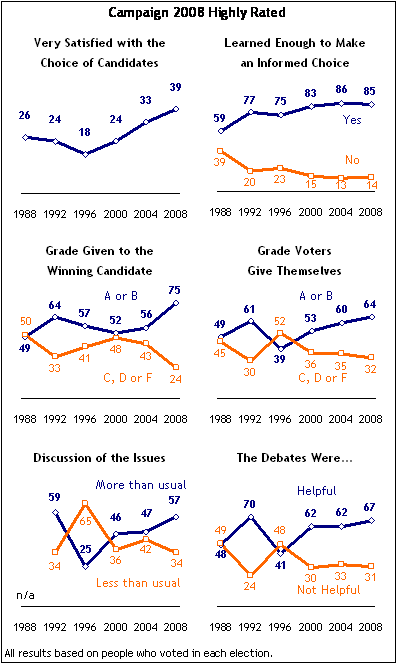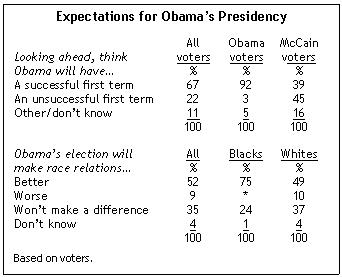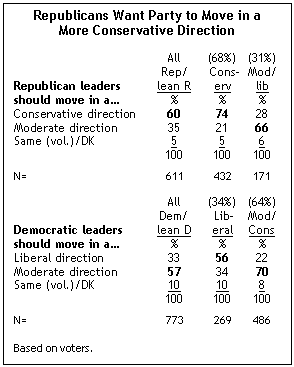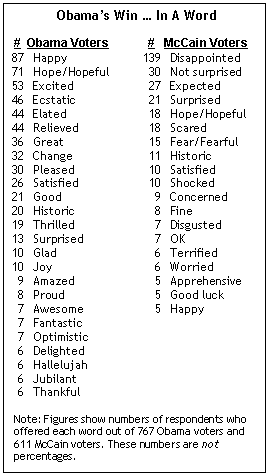Overview
A week after the election, voters are feeling good about themselves, the presidential campaign and Barack Obama. Looking ahead, they have high expectations for the Obama administration, with two-thirds predicting that he will have a successful first term.

The quadrennial post-election survey by the Pew Research Center for the People & the Press finds greater satisfaction with the choice of presidential candidates than after any election in the past 20 years. In addition, Obama gets by far the highest grades for any winning candidate in that period. The survey was conducted Nov. 6-9 among 1,500 voters reached by both landline and cell phone who were originally interviewed in mid-October.
Fully 75% of voters in the re-contact survey give Obama a letter grade of A or B for the way he conducted himself during the campaign, with 45% awarding Obama an A. Voters also gave Bill Clinton high grades following his 1992 victory (64% A or B; 26% A). But Obama’s grades far surpass Clinton’s.
Voters applaud their own work on Nov. 4: 64% give themselves grades of A or B. Four years ago, 60% of voters gave themselves grades of A or B. The campaign itself also is highly rated: fully 85% say they learned enough about the candidates and the issues to make an informed choice. And nearly six-in-ten (57%) say there was more discussion of the issues compared with past elections; that is the highest percentage expressing this view since 1992 (59%).
The belief that Obama will have a successful first term is nearly universal among his own supporters (92%). Nearly four-in-ten of those who voted for McCain (39%) also believe that Obama will have a successful first term, while slightly more (45%) say he will be unsuccessful. After the 2004 election, far fewer supporters of John Kerry (26%) said they anticipated that Bush would have a successful second term.

A majority of all voters (52%) say that Obama’s election will lead to better race relations in the United States; 35% say the election will not affect race relations, while 9% say Obama’s election will make race relations worse. Fully three-quarters of African Americans expect race relations to improve as a result of Obama’s election. White voters, however, are evenly divided with about as many saying they expect race relations either to stay the same or get worse (47%) as say they will get better (49%).
Roughly three-quarters (74%) of all voters – including a solid majority of Republicans (56%) – say that GOP leaders should work with Obama to accomplish things, even it means disappointing some supporters; a comparable percentage (77%) says that Democratic leaders should work cooperatively with their Republican counterparts, even if it means disappointing their party’s supporters.
Notably, most voters (60%) say that Obama should appoint Republicans to serve in important positions in his administration; very few (4%) oppose an appointment from the opposing party, while 35% say it does not matter. As expected, support for an appointment of a member of the opposing party is widespread among Republicans (71%), but a narrow majority of Democrats (51%) also favor Obama choosing a Republican for a key administration post.
Despite the support for bipartisanship among members of both parties, the proportion of voters who say they expect relations between Republicans and Democrats to improve has increased only modestly. Fewer than four-in-ten (37%) say they expect relations between Republicans and Democrats to get better in the coming year, up from 29% following the 2006 midterm elections which resulted in divided government. Nearly all of the increased belief in improved relations has come among Democrats; slightly fewer Republicans believe that relations between the parties will get better than did so two years ago.
After a hard-fought election campaign, most Republican and Republican-leaning voters (63%) describe Obama as “inspiring.” Almost four-in-ten GOP voters (38%) say Obama makes them feel “hopeful,” and 36% say he makes them feel “proud.” In March, just 22% of registered voters who were Republicans or leaned toward the GOP said Obama made them feel proud. However, a large majority of Republican voters (72%) say the term “risky” describes the president elect.
As Republicans contemplate the party’s future, they are expressing support for a more conservative approach from GOP leaders. Six-in-ten Republican and Republican-leaning voters say they would like to see Republican leaders in Washington move in a more conservative direction; just 35% say they favor the party’s leaders pursuing a more moderate approach.

In part, this reflects the fundamentally conservative balance within the GOP electorate. Roughly two-thirds (68%) of Republican and Republican-leaning voters identify themselves as conservative, and three-quarters of these voters think the party should turn further to the right. While a majority of the moderates and liberals within the party advocate a centrist approach, they make up fewer than a third (31%) of Republican voters overall.
Democrats, by contrast, favor their leaders moving in a more moderate, rather than a more liberal, direction in the coming years. A 57% majority of Democrats and Democratic-leaning voters say the party’s leaders should move in a more moderate direction; just 33% say the party should pursue a more liberal course. A majority of Democrats and Democratic-leaners describe themselves as moderate or conservative ideologically, and 70% of these voters favor the party pursuing a more moderate agenda.
About a third of Democratic voters overall describe themselves as liberal, and most want the party to move further to the left. Nonetheless, while 56% of liberal Democrats favor the party moving in a more liberal direction, 34% say the party should move to the center. By contrast, conservative Republicans are far more unified in saying that their party’s leaders should turn to the right (74%), rather than the center (21%).
Election Reactions

Nearly six-in-ten voters (58%) say they are happy that Barack Obama was elected president. These opinions – as well as overall reactions to the election – are divided along partisan lines. Nearly all Democratic voters are happy that their party’s candidate won, while 75% of Republicans express unhappiness. Among independent voters, a majority says they are happy about Obama’s win (57%) and about a third (32%) says they are unhappy.
When voters are asked for a single word that describes their reaction to Obama’s victory, Obama supporters mentioned their joy over his triumph, with words like “happy,” “excited,” and “ecstatic” frequently used. A substantial number of Obama voters also mentioned the words “hope” or “hopeful” to characterize their reaction to the election.
McCain’s supporters generally expressed disappointment over the election outcome, although many said that they had anticipated his defeat. Indeed, more McCain voters said they were “not surprised” or used the word “expected,” than said they were surprised or shocked by the election result. Some McCain supporters also used the words “hope” and “hopeful” to describe their reaction to the election, while others expressed fear or apprehension.




